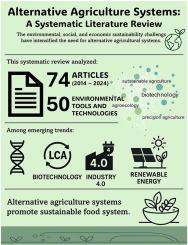替代性农业系统的最新进展及其与可持续性的关系:用于缓解气候和环境危机的工具和技术
IF 5.3
2区 环境科学与生态学
Q2 ENVIRONMENTAL SCIENCES
引用次数: 0
摘要
环境和气候危机加剧了对农业系统可持续发展的新观点的需要。本研究对替代农业系统及其解决环境、社会和经济可持续性挑战的潜力进行了系统的文献综述。通过对2014年至2024年间发表的74篇同行评议文章(其中50篇提出了具体的环境工具或技术)进行定性分析,本综述探讨了替代农业系统的理论基础、它们的类型学以及用于减少传统农业影响的创新。为此,使用了文献计量学工具和VOSviewer共现图。该研究还确定了开展研究的主要国家、主题演变和可持续农业的新趋势。研究结果显示,人们对替代农业系统的科学兴趣日益浓厚,特别是在2014年至2021年之间,生物技术、生命周期评估和工业4.0是最突出的技术领域。这些发现强调了替代农业系统在促进抗灾和低影响农业实践方面的相关性,并有助于制定可持续粮食系统的政策和技术途径。本文章由计算机程序翻译,如有差异,请以英文原文为准。

The state of the art of alternative agricultural systems and their relationship with sustainability: Tools and technologies used to mitigate the climate and environmental crisis
The environmental and climate crises have intensified the need for a new perspective on agricultural systems toward sustainability. This study presents a Systematic Literature Review focused on Alternative Agricultural Systems and their potential to address environmental, social, and economic sustainability challenges. By qualitatively analyzing 74 peer-reviewed articles published between 2014 and 2024, of which fifty presented specific environmental tools or technologies, this review explores the theoretical foundations of Alternative Agricultural Systems, their typologies, and the innovations employed to reduce the impacts of conventional agriculture. For this purpose, bibliometric tools and co-occurrence mapping using VOSviewer were applied. The study also identified the main research-conducting countries, thematic evolution, and emerging trends in sustainable agriculture. The results reveal a growing scientific interest in Alternative Agricultural Systems, particularly between 2014 and 2021, highlighting Biotechnology, Life Cycle Assessment, and Industry 4.0 as the most prominent technological fields. These findings emphasize the relevance of Alternative Agricultural Systems in promoting resilient and low-impact agricultural practices and contribute to the formulation of policies and technological pathways for sustainable food systems.
求助全文
通过发布文献求助,成功后即可免费获取论文全文。
去求助
来源期刊

Environmental Development
Social Sciences-Geography, Planning and Development
CiteScore
8.40
自引率
1.90%
发文量
62
审稿时长
74 days
期刊介绍:
Environmental Development provides a future oriented, pro-active, authoritative source of information and learning for researchers, postgraduate students, policymakers, and managers, and bridges the gap between fundamental research and the application in management and policy practices. It stimulates the exchange and coupling of traditional scientific knowledge on the environment, with the experiential knowledge among decision makers and other stakeholders and also connects natural sciences and social and behavioral sciences. Environmental Development includes and promotes scientific work from the non-western world, and also strengthens the collaboration between the developed and developing world. Further it links environmental research to broader issues of economic and social-cultural developments, and is intended to shorten the delays between research and publication, while ensuring thorough peer review. Environmental Development also creates a forum for transnational communication, discussion and global action.
Environmental Development is open to a broad range of disciplines and authors. The journal welcomes, in particular, contributions from a younger generation of researchers, and papers expanding the frontiers of environmental sciences, pointing at new directions and innovative answers.
All submissions to Environmental Development are reviewed using the general criteria of quality, originality, precision, importance of topic and insights, clarity of exposition, which are in keeping with the journal''s aims and scope.
 求助内容:
求助内容: 应助结果提醒方式:
应助结果提醒方式:


